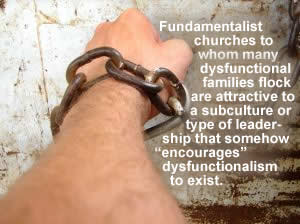Shepherding the Dysfunctional, Part 2
Read Part 1.
Author’s Note: Again, this section and series should not be viewed as an exhaustive treatment of the topic. These are mostly pastoral observations based on 17 years of local church ministry and on a desire to see hurting people grow to be spiritually producing, mentally stable, and emotionally strong disciples of Jesus of Nazareth—all the while remaining Baptist!
In Part 1, we introduced the idea of dysfunctionalism. We noted that often the term is used in excess. That is, it is used as an excuse or a “way out” for those entangled in a habit, a life pattern, or an addiction. I gave my own definition for “dysfunctionalism.” I see it as an ongoing emotional and/or active behavior that is sinful, harmful, disruptive, and habitual. In Part 1, I listed examples of dysfunctionalism within the typical fundamental church. We ended the first installment by looking at how we might help those “the world” might call “dysfunctional.” I ended the first part by noting that Fundamentalism seems to attract a form of dysfunctionalism. I ended with a commitment to return and answer the question of “why?” I present the first part of that answer here. I believe there are a few more points to this issue, but I do not promise that there will necessarily be a Part 3 to this series. Here is my hypothesis statement: Fundamentalism attracts dysfunctional families, especially when the leadership or subculture of that specific fundamental church is partially dysfunctional itself.
an excuse or a “way out” for those entangled in a habit, a life pattern, or an addiction. I gave my own definition for “dysfunctionalism.” I see it as an ongoing emotional and/or active behavior that is sinful, harmful, disruptive, and habitual. In Part 1, I listed examples of dysfunctionalism within the typical fundamental church. We ended the first installment by looking at how we might help those “the world” might call “dysfunctional.” I ended the first part by noting that Fundamentalism seems to attract a form of dysfunctionalism. I ended with a commitment to return and answer the question of “why?” I present the first part of that answer here. I believe there are a few more points to this issue, but I do not promise that there will necessarily be a Part 3 to this series. Here is my hypothesis statement: Fundamentalism attracts dysfunctional families, especially when the leadership or subculture of that specific fundamental church is partially dysfunctional itself.
Important Side Note: Though some churches and leadership teams are not dysfunctional themselves, they will attract some who are dysfunctional—in part because those people long for “normality.” They haven’t experienced biblical, healthy normality, and they want it. My fear is that in most cases, fundamentalist churches to whom many dysfunctional families flock are attractive to a subculture or type of leadership that somehow “encourages” dysfunctionalism to exist. I know this statement sounds weird, but I’m convinced that in many Type A—especially Type A+—churches dysfunctional families are attracted to heavy-handed leadership and other forms of spiritually or emotionally abusive leadership. Believers in these churches almost view this form of leadership as a form of asceticism. The mentality is this: “I’ve been whipped, so now I can live my life. Next week, I’ll get whipped again, but I’ll feel better afterwards.” Bizarre!
I quoted Wikipedia in the first installment of this presentation. Our friends there note that a dysfunctional family is one in which
conflict, misbehavior and even abuse on the part of individual members of the family occur continually, leading other members to accommodate such actions. Children sometimes grow up in such families with the understanding that such an arrangement is normal. Dysfunctional families are most often a result of the alcoholism, substance abuse, or other addictions of parents, parents’ untreated mental illness/defects or personality disorders, or the parents emulating their own dysfunctional parents and dysfunctional families experiences.
Apart from the sinfulness of those who are dysfunctional, what attracts dysfunctional families to fundamental churches?
Answer #1: Dysfunctional Leadership!
When do we find dysfunctional leadership? Dysfunctional leadership occurs when leaders have ignored, replaced, or forgotten the “job description” of biblical leadership. When that neglect happens, a form of dysfunctionalism grips the specific ministry in question. If that statement is true, we should agree that it’s important to have a biblical job description for ministry leadership.
The following is my first cut at a biblical “job description” for ministry leadership, especially pastors. By the way, this list mostly comes from New Testament passages that outline the responsibilities of those who would serve as elders, bishops, or pastors. In some cases, those responsibilities came from other passages (either Old Testament or New Testament) that outline “general leadership responsibilities” for all biblical leaders. I’ve tried to exclude leadership responsibilities we no longer have today, such as a prophet’s raising the dead. That’s a responsibility we shouldn’t have today—that is, unless a church features a certain type of music in its worship service. In that case, pastors will need this skill! (Forgive my friendly jab at the Beethoven Group and Type As everywhere.) Okay, here’s the list:
- Ministry Planning—“planning the work.” See our Lord’s example of planning and leadership in Luke 14:28-31.
- Preaching—“feed” (Acts 20:28; 1 Tim. 5:17).
- Teaching/Doctrine—“feed” (Acts 20:28, 1 Tim. 3:2; 5:12, 13, 17).
- Discipleship—(Matt. 28:19-20).
- Evangelism—(Matt. 28:19-20; Phil. 1:27).
- Leading With Discernment (Acts 20:17; Phil. 1:9-10, 3:2) and Without a Heavy-Handedness or “Lording it over” (1 Pet. 5:3).
- Loving Christ’s Body—(Phil. 1:9). The Type As who want to tag this doctrine as “new-evangelical” need to understand that Gaius, not Diotrophes, was the “good guy” in 3 John!
- Mentoring and Training New Leadership—(1 Tim. 2:1; 5:22; 2 Tim. 2:2).
- Mentoring and Training Present Leadership—(1 Tim. 5:22; 2 Tim. 2:2).
- Missions Work—See Antioch model (Acts 13:2-4).
- Communicating and Working With Deacons—(Phil. 1:1, Acts 6; also see working with deaconesses [Phoebe in Rom 16!] without a heavy-handedness or “Lording it over” those deacons [1 Pet. 5:3]. Oh yeah, I said that already.)
- Reading and Studying the Scriptures (Acts 6:4; Phil. 1:9)
- Visiting Those Who Are “Weak”—(James 1:27, especially the fatherless and widows).
- Delegating—Using believers’ giftedness (1 Cor. 12, 14, etc.) without a heavy-handedness or “Lording it over” (1 Pet. 5:3). Here a senior pastor can actually submit to those structurally or organizationally “underneath” him because the other leader and/or member has been gifted in an area where he, the pastor, is not. Unless his submission in some way undermines the health of the congregation, he should submit to the wisdom of the brother or sister in question. By the way, when a pastor delegates continually, he will have all the authority he needs because the congregation will trust him and will actually enjoy submitting to a leader who has consistently been “Spirit-controlled,” not “power-controlled or driven.” (No, I do not believe in “evangelical feminist egalitarianism,” but feel free to read Eph. 5:21.) Another side thought: If fundamental churches have “power-controlled or driven-oriented” leaders, dysfunctional families will flock to them like flies to trash! We especially see this tendency in the way “spiritually abusive” pastors reproduce “spiritually abusive” husbands. It’s a sad deal! The real losers are the poor sisters in Christ and their children who get saddled with these so-called “men of God.”
- Comforting—(1 Thess. 5:11; Rom. 12:15—“mourn with those that mourn”).
- Nurturing, Shepherding, Defending, or Watching—(Acts 20:28-30).
- Ruling or Administrating (1 Thess. 5:12-13; 1 Tim. 3:5; 5:17) Without a Heavy-Handedness or “Lording It Over”—(I did it again. I don’t know why I keep mentioning that one.)
- Hospitality—(1 Tim. 3:2; 3 John 1-4).
- Pastoral Seasons of Prayer—(Acts 6:4).
- Leading the Church With a Goal Toward Consensus—(Acts 6:5).
- Leading in the Ordinances of the Local Church—(Matt. 28:19-20).
- Leading the Body in Stewardship—(1 Tim. 6:17).
- Correcting, Rebuking, and Restoring (Gal. 6:1, 1 Tim. 5:13) Without a Heavy-Handedness or “Lording It Over”—(Sorry, that phrase just keeps coming up!)
- Leading and Loving His Own Wife and Children—(1 Tim 3). By the way, pulpit committees would do well to privately ask the wife and children how the “pastor-to-be” does by way of consistent loving, nurturing, playing, correcting, singing, and having great times together.
In conclusion, when we have pastors and other leaders who are not engaged in the New Testament job description of leadership, we encourage dysfunctionalism. When we have deacons and congregations who want to give the pastor a “job description” that is more in line with IBM and less in line with the New Testament, that tendency will also lead to dysfunctionalism.
Maybe more later.
Straight Ahead!
Phil 3:12-14
Joel Tetreau
 Dr. Joel Tetreau is senior pastor at Southeast Valley Baptist Church (Gilbert, AZ). He is on the adjunct faculty at International Baptist College and serves as co-director of SW Romania Missions Project. Dr. Joel Tetreau is senior pastor at Southeast Valley Baptist Church (Gilbert, AZ). He is on the adjunct faculty at International Baptist College and serves as co-director of SW Romania Missions Project. |
- 6 views


Discussion